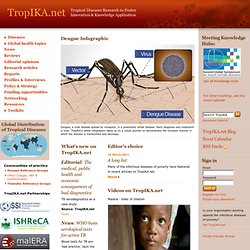

Desert Locust situation update 19 November 2013. Home. THE MERCK VETERINARY MANUAL. Eucalb.com. Infectious Disease Reporting System/IDRS: Columbus Public Health & Franklin County Public Health, Ohio - Home. Zoonoses. HealthMap. USGS Disease Maps. Centers for Disease Control and Prevention. Emerging and Vector-borne Diseases Programme. Vector questionnaire tool: Collecting data on disease vectors in Europe ECDC collects information on the distribution and surveillance of vector species with the help of experts throughout Europe.

The data are compiled to produce comprehensive online maps, providing the ECDC stakeholders and general public with most up-to-date information on vector distribution. The collected information can also support relevant ECDC risk assessments on the diseases that these vectors can be associated with. To improve the quality and representation of data, streamline the collection of information and reach out to more external experts, ECDC, through the VBORNET network, developed the vector questionnaire tool allowing external experts to insert directly their data in an online database.
Experts that wish to contribute can register and submit data at various administrative scales (NUTS 1-2-3), they can also request access to other vector information in the database. European Centre for Disease Prevention and Control. Vector Ecology and Management (VEM) Tropical Diseases Research to Foster Innovation & Knowledge Application. Editor's choice 10 March 2011 A long list Many of the infectious diseases of poverty have featured in recent articles on TropIKA.net.

More Videos on TropIKA.net Malaria - Killer of children Malaria is one of the biggest killers of young children in Africa, where the number of doctors and health care centres are few. TDR e-news on TropIKA.net World Malaria day — A Day to Act TDR supports World Malaria Day - research on the rational use of drugs 25 April is a day to commemorate global efforts to control malaria. Home - Division of Vector-Borne Diseases - NCEZID. Skip directly to search Skip directly to A to Z list Skip directly to site content Skip directly to page options CDC Home CDC 24/7: Saving Lives.

Protecting People.™ <div class="noscript"> Note: Javascript is disabled or is not supported by your browser. Division of Vector-Borne Diseases (DVBD) Tick-borne encephalitis. Crimean Congo haemorrhagic fever. Lyme Disease Home Page. Mosquito Borne Disease and Control. This page is designed to provide informational products on mosquito identification, the diseases that they carry and their prevention on military installations.

Related Public Health Command Publications ● Fact Sheets: ● Wallet Cards: o DoD Insect Repellent System o Fight Malaria - Take Your Medication Tip Card ● Posters: o Fight Malaria - Take Your Medication Poster o Mosquitoes SUCK – Don’t be Prey; Protect Yourself! ● Technical Guide: o USAPHC Technical Guide 336 Malaria Field Guide ● Websites: o DoD Insect Repellent System o FR ACU-P Additional Guidance Documents ● AFPMB PPMs Information Paper , "Protect Yourself Against Biting Insects," February 2001 ● AFPMB Technical Guide 36 , "Personal Protective Measures Against Insects and Other Arthropods of Military Significance" ● AFPMB Technical Guide 41 , “Dengue and Chikungunya Vector Control Pocket Guide,” January 2012 , and MCRP 4-11.1D, "Field Hygiene and Sanitation," 21 June 2000 , "U.S. Supplies ● DoD Pest Management Materiel Other Than Pesticides. Chikungunya fever.
Dengue. Malaria. Malaria and TravelThe most recent malaria data show a huge increase in malaria cases reported in the United States.Learn More » FDA Revises Mefloquine LabelingDrug Still RecommendedLearn More » Malaria is a mosquito-borne disease caused by a parasite.

People with malaria often experience fever, chills, and flu-like illness. Left untreated, they may develop severe complications and die. In 2010 an estimated 219 million cases of malaria occurred worldwide and 660,000 people died, most (91%) in the African Region. CDC's Malaria Program.